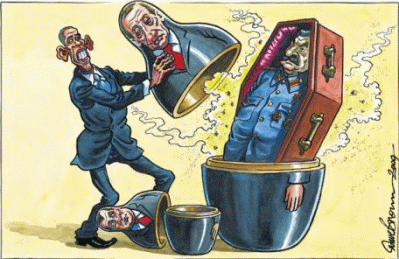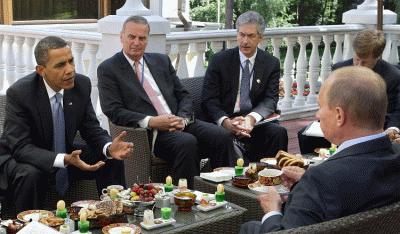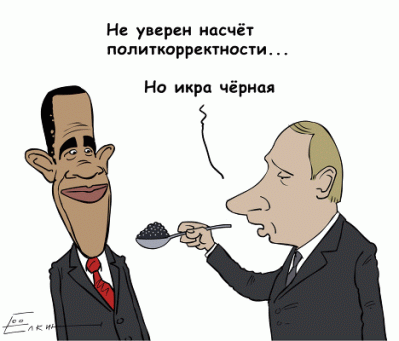
[The
Independent, U.K.]
Gazeta, Russia
Obama in Russia: Symbolism Between Unequal Partners
"The first visit
to Moscow of President Barack Hussein Obama was saturated to the limit with
symbolic events. Because essentially, the Russia and United States of today have
nothing to talk about. In terms of global politics, the two countries are in
different leagues."
EDITORIAL
Translated By Yekaterina
Blinova
July 7, 2009
Russia - Gazeta
- Original Article (Russian)
The nearly three days that the most popular political leader
in the world has been spending in Moscow are practically a continuous theater
of facial expressions and gestures - a game of political symbols. The program
includes meetings with the president of Russia and the opposition -
parliamentary as well as non-parliamentary (but brought together, in order to
dilute, so to say, Nemtsov with Zyuganov [two leaders on the extreme left and
right]) But traditionally, all U.S. presidents meet with the government and opposition
in the course of such visits. Although it must be said that George Bush didn't
do so while in Russia, which pleased his “friend" Vladimir to no end.
The visit to the Tomb of the Unknown Soldier was a symbolic
act recognizing the decisive role of the Soviet Union (which in the U.S. was
then called “Russia”) in the victory over Hitler's Germany, as well as a
gesture that the Russian authorities could then interpret as the personal
contribution of Comrade Obama to the fight against, “falsifications of history
to the detriment of Russia.”

The
president and first lady are ushered over to the Tomb of the
Unknown
Soldier at the Kremlin wall in Moscow, June 6.
[click here or click photo for jumbo slide show]
Routine meetings between the business circles of the two countries
were held - although American business is now hardly concerned with Russia; and
Russian business, with its gigantic debt to Western creditors, is hardly
interested in America.
Posted by WORLDMEETS.US
A special symbolic subtext of Barack Obama’s meeting with Prime
Minister Vladimir Putin, whom he called during pre-visit interviews “a strong
leader,” but who he accused of being a politician who has, “one foot in the old
ways of doing business and one foot in the new." As a comparison,
Medvedev's American colleague called him a “progressive person.” Therefore, he
almost straightforwardly made it clear which of the two Russian leaders he
prefers. Of course, Obama is meeting with Putin as a symbol of power in Russia,
clearly demonstrating that his administration considers the current Russian
prime minister an extremely influential figure, and doesn't consider Medvedev the
only negotiating partner.
One can, of course, calculate that Obama will spend
seven or eight hours face to face with Medvedev, and only an hour and a half
with Putin. But protocol doesn't oblige the American president to meet with the
Russian prime minister at all. If, however, Obama didn't met with Putin, it would
be a very important sign to the signal-hungry Russian political elite. The
U.S. administration would thus be openly demonstrating that it was placing all its
bets on Medvedev as the fully-fledged Russian leader, which would have significantly helped
Russia's head of state strengthen his position in the eyes of the domestic
bureaucracy. But Obama’s breakfast with Putin automatically became Washington’s
recognition of our tandemocracy. So far, the Obama administration is
operating on the assumption that Russia is ruled by two leaders.

It was a breakfast of fruit, caviar, pheasant dumplings and
tea prepared in the traditional Russian style, as President
Obama met Prime Minister Putin, at Putin's residence just
outside Moscow on Tuesday morning.
[click here or click photo for jumbo slide show]
When we talk of the substantive part of the visit, we refer
only to the signing of the treaty to reduce offensive nuclear weapons. That's the
only issue that really governs relations between the two countries, and it's tied
to a specific deadline: the START
I [The Strategic Arms Reduction Treaty] expires on December 5, 2009. And come hell or high water, to
hinder a new and uncontrolled nuclear arms race, the two great nuclear powers
(this is practically the only area where Russia and the United States are equal)
must sign a new treaty. But for now, despite the
relatively optimistic statements issued by the Russian Foreign Ministry, it's
too early to tell whether Obama and Medvedev are ready, during the current
visit, to complete their historic mission in this sphere: making good on approving
START II [they did not].
Posted by WORLDMEETS.US
In everything else, Russian-American relations, even without
the anti-American hysteria that was consciously cultivated by the Russian
government throughout the 2000s - is one of unequal powers not especially
interested in one another. Although on the eve of his visit, Barack Obama was politically
correctly in promising to build a relationship with Russia an equal footing in
terms of influence on global processes, America doesn't recognize Russia as an
equal. For the United States, it is far more important to build a relationship
with China, since it is a country that has far more economic and political
potential and hence a claim on the role of a global superpower. Russia exceeds
China in terms of its foreign policy ambitions, but its actual capacity to
influence the global agenda is greatly exaggerated by the Russian government.

PUTIN
SAYS TO OBAMA: 'I DON’T KNOW IF THIS IS POLITICALLY
CORRECT,
BUT THE CAVIAR IS BLACK' [RATHER THAN RED].
[Novosti, Russia]
Of course, all this does nothing to diminish the meaning of
Barack Obama’s first visit to Moscow. After all, the president of the world's
top power is obliged to communicate with the leaders of any country with the number
of nuclear weapons and ambitions that Russia has. And even the words of Dmitriy
Medvedev about the deterioration of Russian-American relations in an era when Presidents
Putin and Bush had excellent personal relations doesn't exclude the importance
of good relations between the current presidents of the two countries. After
all, against the backdrop of today's ties between the U.S. and Russia, the personal
contact of their leaders is almost the central mitigating factor.
But Russia should be aware that in the prevailing world order,
it doesn't have the objective capacity to be an equal partner of the United States
- and the United States is hardly able or willing to establish it as such in
the future. So for now, we can speak of equality in only symbolic terms.
SEE ALSO ON THIS:
Kayhan, Islamic Republic of Iran:
Obama's Trip: 'How they Laughed in Moscow'
Gazeta, Russia:
Medvedev and Obama: 'Resetting' U.S.-Russia Ties Won't Come Easy
Gazeta, Russia:
The Kremlin Balanced 'Between Two Chairs': Iran's and the West's
Gazeta, Russia:
Anti-Americanism for Russian Public Consumption Only
Gazeta, Russia:
Beyond Capitalism and Communism
Novosti, Russia:
Why Medvedev Can Meet Ahmadinejad - But Obama Cannot
Izvestia, Russia:
Russia Can Help Obama With Muslims
Izvestia, Russia:
'Overloaded' With U.S. English as the Language of Diplomacy
CLICK HERE FOR RUSSIAN
VERSION
[Posted by WORLDMEETS.US July 8, 1:36am]